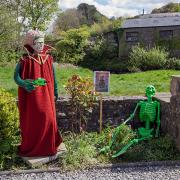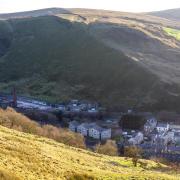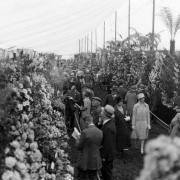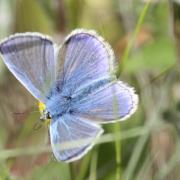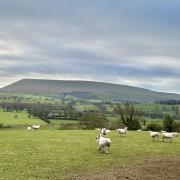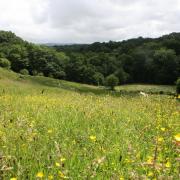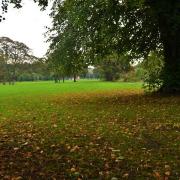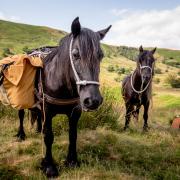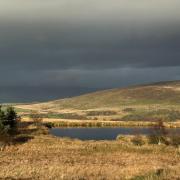Seventy years ago it was slick of filth. Now a five star hotel is arranging trout fishing trips on the River Irwell. Andrew Griffiths finds out what’s gone right

It was almost 70 years ago that a Lancashire river made headlines in the Daily Dispatch newspaper: ‘Roach caught in Irwell!’ The fact that anything was living in what had once been described in Parliament as a ‘disgrace’ was deemed remarkable.
‘That was how significant the catching of a fish in the river was then,’ 79-year-old Tom Duddy tells me. We are sitting by the river in Springwater Park, Whitefield, on the outskirts of Manchester and we have just been fly fishing for wild brown trout. Tom, who does this every Wednesday evening during the season, which runs from April to the end of September, is talking about the changes he has seen in the river during his lifetime and it is an obvious source of pleasure.
In the early 1970s Tom taught in the local girls’ grammar school, which was on the banks of the Irwell. ‘The river then was a byword for filth and pollution,’ he says. ‘If anybody fell in, they would be carted off to hospital straight away. Fortunately, Salford Royal was right next door to the school!’
Now, here we are, a few decades later and Manchester’s five star Lowry Hotel is offering fly fishing trips to its guests on the Irwell. Tom can’t quite believe he has lived to see it.

‘It is amazing,’ he says. ‘Beyond belief. To catch a fish at all in the Irwell is a great thrill for me.’ I’ve been fishing with three generations of the angling-mad Duddy family: Tom’s son Mike, 49, and grandson Matthew, 19. As we talk, Matthew, a keen fly fisher himself, learns with increasing incredulity about how the Irwell used to be.
‘It’s mental when you think about it,’ says the youngster. ‘It is there now as clean as it is, and that’s all that I’ve ever really known. But you hear these stories about people going to hospital to have their stomachs pumped if they fell in it and that’s crazy. A huge amount has changed, obviously.’
A significant part of that change is down to the efforts of Mike Duddy, who is chairman of local fishing club, the Salford Friendly Anglers’ Society, said to date back to 1817 making it the oldest fishing club in the world. It’s a role he took after someone went to his door and handed him the archives of the almost defunct club.
The first thing he and some like-minded friends did was throw open the doors of this private club and make it free to join. Using social media, the membership of this angling and environmental campaigning group now stands at almost 2,500 and last year their efforts on the River Irwell were recognised when they won their first major conservation award.
The Irwell rises on the moors above Bacup and towards the end of its 39 miles it forms the boundary between the cities of Manchester and Salford before joining the Mersey.
It is a post-industrial river in recovery but it has a long way to go to regain full health, but much progress has been made in the last few years, largely due to European Union directives.
The Irwell catchment became an Environment Agency (EA) pilot project in 2011, the culmination of the first real campaign spearheaded by Salford. Their ‘Action Irwell’ became ‘The River’s Return’, a catchment partnership now coordinated by the environmental charity Groundwork and involving the EA, local authorities, Irwell Rivers Trust and Lancashire Wildlife Trust, among others.
Mike Duddy is now turning his campaigning efforts to the River Irk, which joins the Irwell in Manchester city centre. Its current status is poor and unloved. At the request of Salford Friendly Anglers, a preliminary report was carried out on the Irk by the Wild Trout Trust, a charity which specialises in river restoration projects.
Leonard Shaun, the trust director, describes how they could ‘take down a weir, put some wiggles back into a river, maybe introduce some gravel if gravel is missing, create marginal habitat for fish and wildlife and plants, then one of our project officers will project manage the work being done on the ground.’
Leonard makes it all sound disarmingly simple. But in the real world, river restorations such as this are complex. Money, of course, is what kick-starts the whole process, and it is in increasingly short supply in the sector.
The Irk has been heavily modified and flows through some of the most deprived communities in the country. ‘The Irk is one of the most challenging water courses, because there is a very high density of population on that side, and some of the water treatment works will be upgraded shortly,’ says Katherine Causer, the Environment Agency’s project manager for the Irwell. ‘And there is a legacy of contaminated land in that part of the catchment.’
But Mike Duddy believes that change happens from the ground up, and that harnessing the power of the people is the way to make environmental change happen and he praises the councils in Manchester and Salford for their support.
Duddy’s campaigning style pulls no punches, and he talks of the ‘Kingfisher effect’. Ask people if they want fish in the river, and non-anglers will not be interested, he maintains. But ask if they would like to see kingfishers and heron, and they will say ‘yes please!’
The bottom line is, if we ensure that the river is a good place for fish, it will be a good place for all life forms, including our own.’
Duddy’s ultimate aim is to see the return of migratory fish to the Irwell catchment. He maintains that if fish passes were incorporated into the locks on the Manchester Ship Canal, his dream of a salmon run would become a reality.
He points to the river just north of the Mersey, the Ribble, where he tells me salmon fishing is worth £26m a year to the local economy. ‘Salmon are a totemic species,’ he says. ‘But we know we are only three fish passes away from having salmon back in the Irwell.’
While salmon are starting to return to the Mersey basin there are, of course, many problems remaining on the Irwell, not least invasive species such as the highly toxic Giant Hogweed, which is choking the banks of the river for mile after mile. Salford Friendly Anglers is currently campaigning for its control.
‘All we want is a river that is as good as everybody else’s,’ says Duddy. ‘We don’t want anything better, all we are saying is that we are a massive centre of population, a massive centre of bill payers, so why is our river not as good as everybody else’s?’
Mike Duddy is now planning to take his ‘people power’ campaigning style beyond the Irwell and Irk, and into the Mersey system as a whole.
As Katherine Causer says: ‘It keeps us on our toes. Certainly from an Environment Agency point of view, Mike keeps me very busy.’
Mike’s award
Mike Duddy was recently named ‘Wild Trout Hero’ at the annual awards of the Wild Trout Trust attended by vice-president Jeremy Paxman. The award, presented at the Savile Club in Mayfair, paid tribute to him as ‘an indefatigable champion for wild trout in the north west of England.’
Merlin Unwin Books has published Trout in Dirty Places, a guide to fly-fishing for trout and grayling in the very centre of towns and cities such as Manchester and Salford. A percentage of the cost goes to the Wild Trout Trust.




